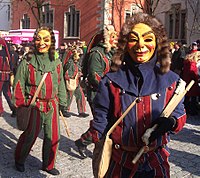
Photo from wikipedia
Purpose This article traces the transformation of hát bội, a form of traditional opera in Southern Vietnam, from its primary role as entertainment into a religious activity after the Reform… Click to show full abstract
Purpose This article traces the transformation of hát bội, a form of traditional opera in Southern Vietnam, from its primary role as entertainment into a religious activity after the Reform (Đổi Mới) were enacted in 1986. Design/methodology/approach This research is based on ethnological fieldwork complemented by a review of historical documents and of the available literature on hát bội, cultural policies and on data collected from interviews with artists and spectators at the festival at the shrine to the Lady of the Realm. Findings Before 1986, hát bội was performed either as a stand-alone entertainment during the fair portion of community festivals or as part of religious ceremonies. The Reform and the accompanying relaxation of state control over religion and culture promoted the resurgence of popular religious fairs across the nation. New opportunities for hát bội to revive opened, artists left state-sponsored troupes to join private companies that catered to religious festivals. But almost exclusive involvement in religious rites has led to artistic stasis for private hát bội troupes. Originality/value This research constitutes novel insights of how the Reform in Vietnam affects the transformation of a traditional performance form.
Journal Title: Asian Education and Development Studies
Year Published: 2019
Link to full text (if available)
Share on Social Media: Sign Up to like & get
recommendations!